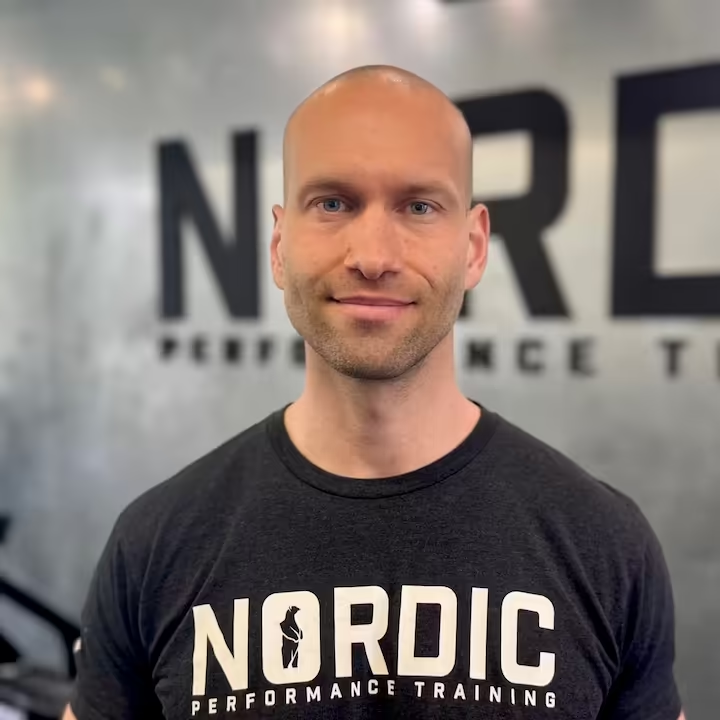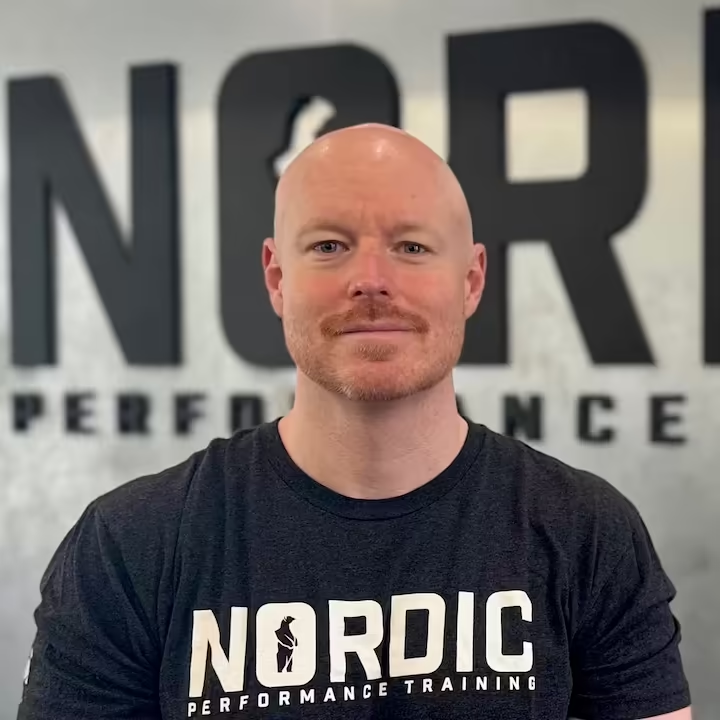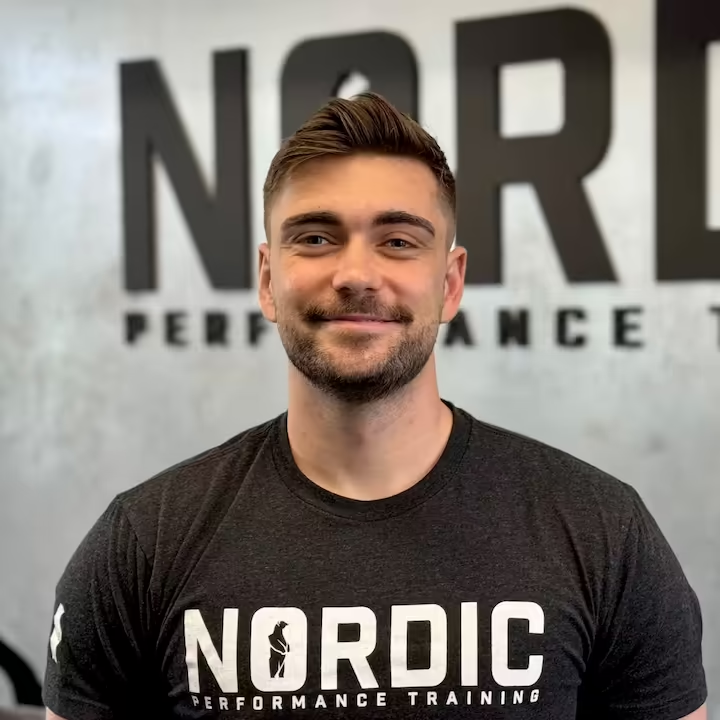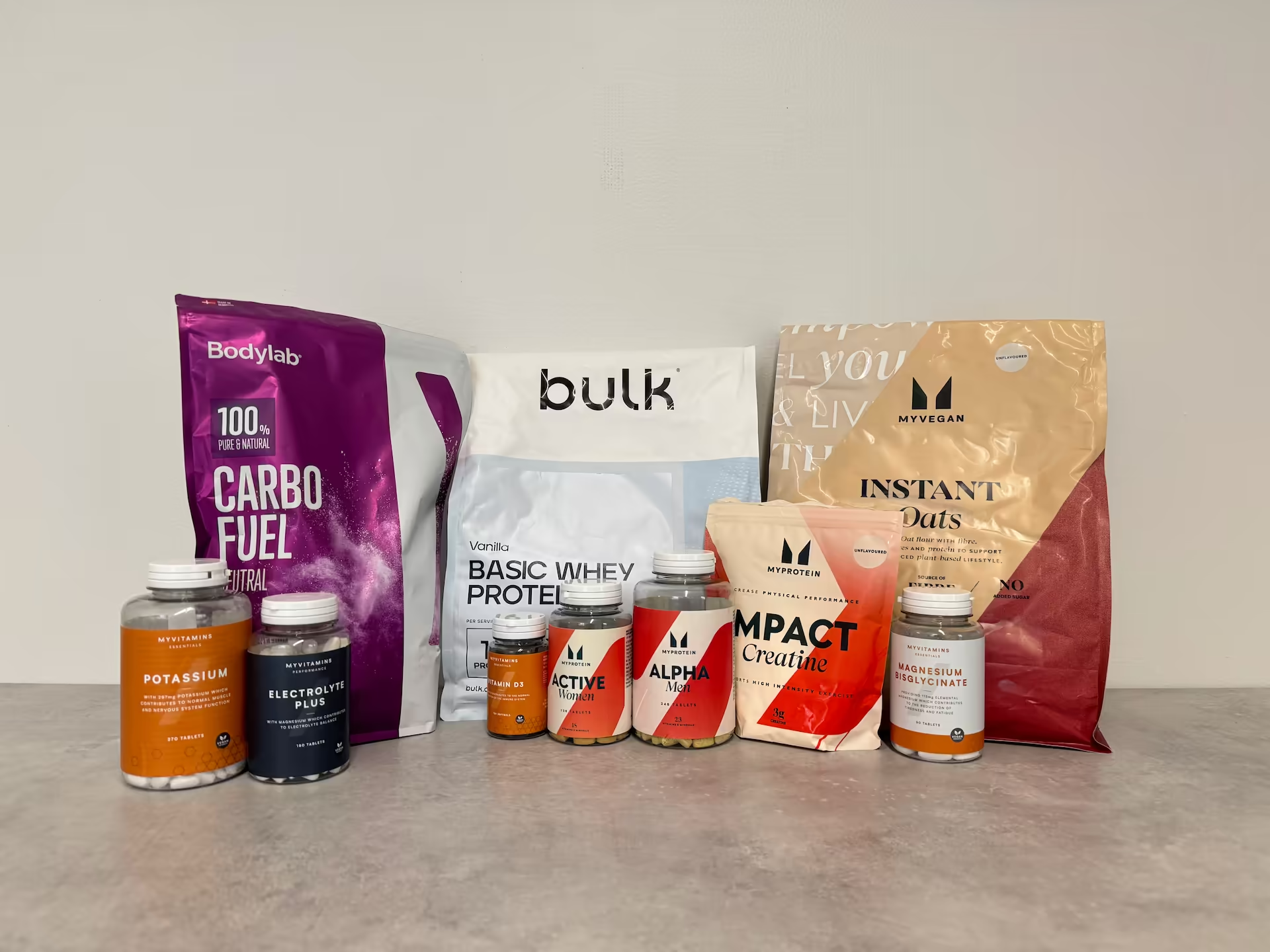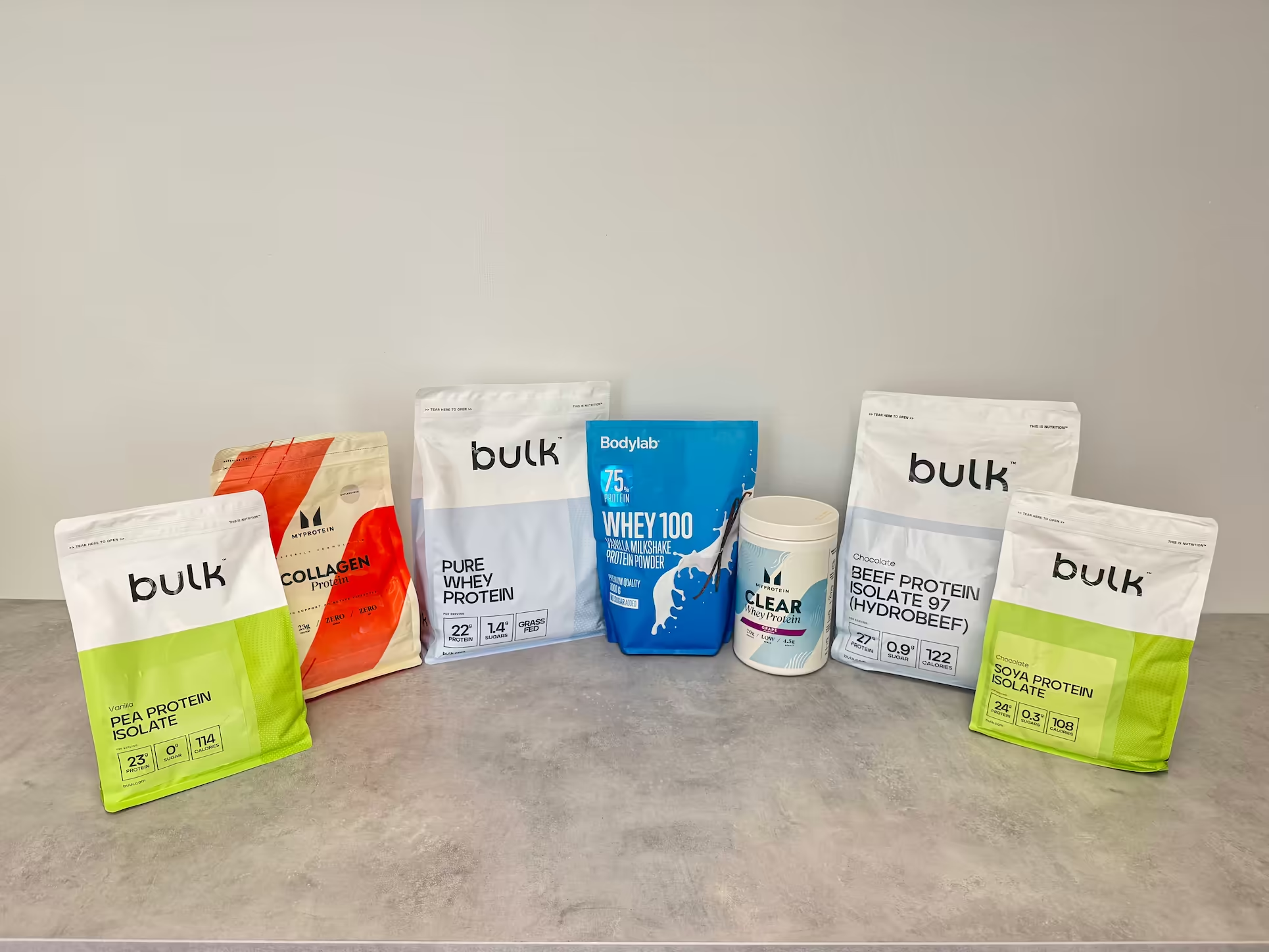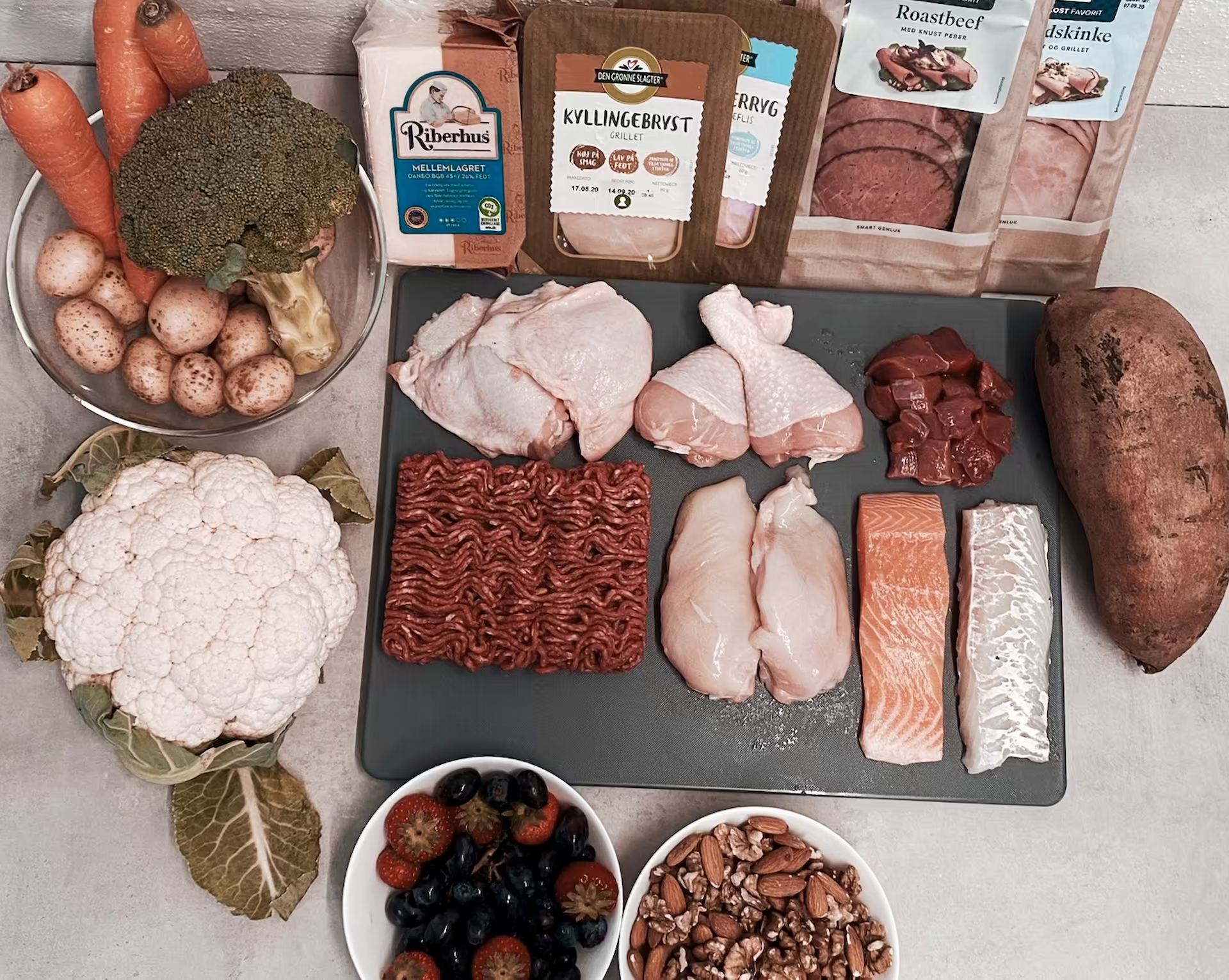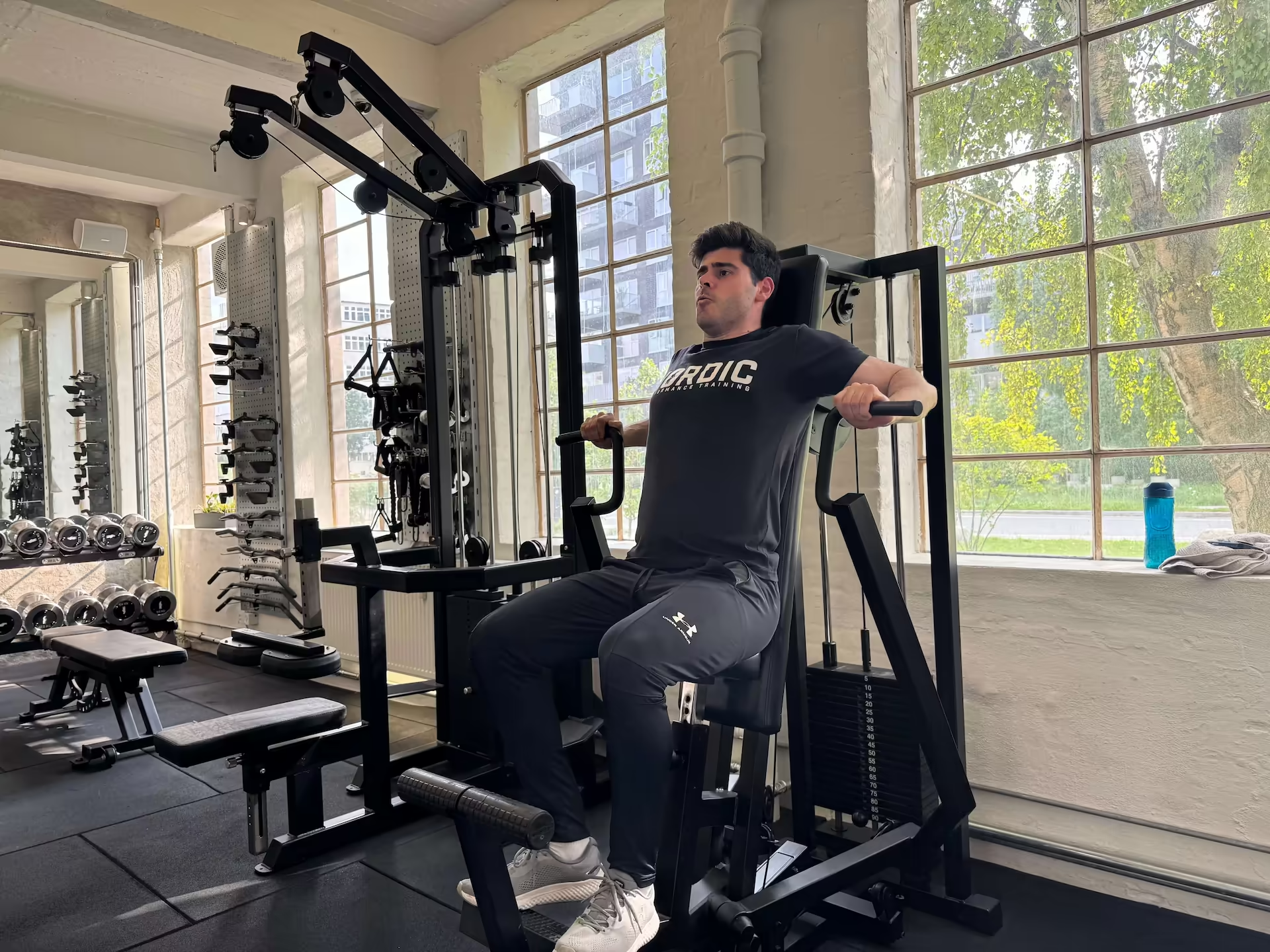Top 5 Best Supplements for Health and Training [2025 Guide]
With over 10 years of experience as personal trainers and physiotherapists and more than 3,000 clients at Nordic Performance Training, we know exactly what actually works – and what doesn't.
Most people take unnecessarily many supplements but see no real difference. It's rarely about taking more products – but about taking the few right ones and using them consistently.
We see the same pattern again and again: people spend thousands of kroner on supplements they don't need, while overlooking the simple solutions that actually make a difference.
An example from our practice: A 37-year-old client lacked energy and had filled his kitchen cabinet with everything from caffeine pills and pre-workout to BCAA, EAA, and "fat burners" – without results. After we reviewed his diet and lifestyle, we found out that he likely lacked vitamin D and Omega-3. When he removed everything unnecessary and only took these two supplements, combined with our Full Body program once a week, his energy, sleep, and training results improved significantly in a few weeks – and he simultaneously saved money and unnecessary complexity.
In this guide, we review exactly which supplements provide measurable results and why – based on data from thousands of training courses at Nordic Performance Training.
The 5 most important supplements – in prioritized order
Before we dive into the details, here's a quick overview of the five supplements that have the strongest documentation and relevance in practice. They are ranked according to what we assess has the greatest effect for most people — from the most basic to the more training-specific.
1. Vitamin D – all people living in scandinavia Oct-Mar
Why it's number 1
In Denmark, the sun is too weak from October to March to cover the body's needs. Even clients with perfect dietary habits often test low in blood samples. Vitamin D is essential for bone building, immune system, and hormone regulation.
Practical use
25 micrograms daily with dinner (fat-soluble vitamin is better absorbed with fat). Take it minimum October-March, many benefit from year-round intake.
Who should avoid it
People who already receive high-dose vitamin D via doctor (typically 35–50 µg daily) should not supplement additionally.
If you take a multivitamin with 25+ micrograms of vitamin D, you don't need a separate supplement – you only risk overdosing without extra effect. When in doubt, a simple blood test at the doctor can determine if your level is optimal.
Price and brands we recommend
A monthly supplement typically costs 10–20 kr. depending on brand and dose.
We recommend choosing known brands with documented products and clear declaration:
- Pharmacy's own brand
- Matas' own brand
- Bodylab
- Bulk
- Myprotein
2. Omega-3 – relevant for most people living in scandinavia year-round
Why it's number 2
The Omega-3 fatty acids EPA and DHA are essential for heart, brain, and inflammation regulation. Very few people eat the recommended two or more fish meals per week, and therefore many get too little Omega-3 through diet. A supplement can be a simple and effective way to ensure the body gets enough of these important fatty acids – especially if you rarely eat fatty fish like salmon, mackerel, or herring.
Practical use
- Take 1,000 mg combined EPA/DHA daily with a meal (it reduces the risk of "fish burps").
- Preferably store the capsules in the refrigerator to preserve freshness.
- Always choose products that are third-party certified for heavy metals and oxidation, so you're sure of the quality.
Who should avoid it
People taking blood-thinning medication should only use Omega-3 after agreement with their doctor. If you eat fatty fish three or more times per week, you likely already get sufficient Omega-3 through diet and don't need supplements.
Price and brands we recommend
A monthly supplement typically costs 40–80 kr. depending on concentration and certification.
We recommend choosing known brands with documented products and clear declaration:
- Pharmacy's own brand
- Matas' own brand
- Bodylab
- Bulk
- Myprotein
3. Multivitamin – your daily safety net
Why it's number 3
A multivitamin covers the small gaps in diet – not because it gives extra energy, but because it ensures you don't lack basic micronutrients like iron, zinc, magnesium, and B vitamins.
For busy people with irregular meals, lots of work, or changing eating times, a multivitamin functions as cheap and practical insurance against deficiencies that can otherwise affect energy, sleep, and recovery.
Practical use
- Take 1 tablet daily with a main meal (breakfast or dinner).
- Preferably choose gender-specific versions, as women generally have higher iron needs than men.
- You can also choose a variant without iron if you eat a lot of red meat or already get iron through other supplements.
Who should avoid it
People with very varied and regular diet rarely need a multivitamin.
If you already take several individual vitamins (e.g., vitamin D, zinc, magnesium), you should ensure you don't overlap or exceed recommended daily doses.
Price and brands we recommend
A monthly supplement typically costs 40–80 kr. depending on brand and composition.
We recommend well-known, documented products with clear declaration:
- Pharmacy's own brand
- Matas' own brand
- Bodylab
- Bulk
- Myprotein
4. Creatine – documented effect on strength and muscle growth
Why it's number 4
Creatine is the most well-documented supplement within strength training and performance optimization. Hundreds of studies show clear effects on both strength, muscle mass, and explosive power.
Documented benefits:
- 10–15% improvement in anaerobic performance
- 5–15% increase in maximum strength
- Increased muscle growth in combination with strength training
- Possible cognitive benefits (improved focus and memory)
Example from our practice
A 42-year-old project manager trained at our personal training gym in Copenhagen according to our Full Body program 1x per week with great results but experienced after 9 months that strength began to stagnate. We considered increasing to 2 weekly sessions, but due to a demanding job and small children at home, time was limited. Instead, we recommended 5 g creatine daily. Over the next six months, all his lifts increased again – without more training sessions – and he regained progress in strength and energy.
Practical use
- Take 5 g creatine monohydrate daily – timing is not crucial.
- Many take it after training, but you can take it anytime, as long as you remember it every day.
- No need for "loading phase" – the effect is achieved after 2–3 weeks of continuous use.
Who should avoid it
People who don't strength train regularly will get minimal effect. If you primarily do cardio, yoga, or low-intensity training, creatine is rarely necessary.
Price and brands we recommend
A monthly supplement typically costs 20–30 kr., as creatine is one of the most affordable and well-documented supplements on the market.
We recommend pure creatine monohydrate products from well-known brands with clear declaration:
- Bodylab Creatine Monohydrate
- Myprotein Creatine Monohydrate
- Bulk Creatine Monohydrate
Creatine works best when combined with structured strength training. Read our in-depth Full Body article, which contains 3 free training programs.
5. Protein powder – practical supplement, not a necessity
Why it's number 5
Protein powder isn't magical – it's basically milk protein in powder form.
For most people, regular food is sufficient, but for clients who don't reach 1.6–2.2 g protein per kg body weight, protein powder can be a practical and flexible supplement.
It's not about taking more, but about making it easier to hit your daily protein goal.
If you already eat sufficient protein through meat, fish, eggs, or dairy products, protein powder is often a waste of money. Read possibly our full Protein Powder Guide and find out if you even need it.
Practical use
- Take 30–50 g per portion after training or between meals.
- All types – whey, casein, or soy – give the same long-term effect on muscle building.
- Use it as a supplement, not as a replacement for real food.
Who should avoid it
People who already meet their protein needs through food don't need to take protein powder. If you want to know for sure, weigh your protein sources for a week – many are surprised by how much they actually get through regular meals.
Price and brands we recommend
A monthly consumption typically costs 200–400 kr. depending on quantity, quality, and any offers.
We recommend well-documented products with clear nutrition declaration:
- Bodylab
- Bulk
- Myprotein
Bonus supplements for special situations
The following two supplements would be number 6 and 7 on the list, but they are very situation-specific.
Most people don't need them regularly, but in certain cases they can have a documented effect.
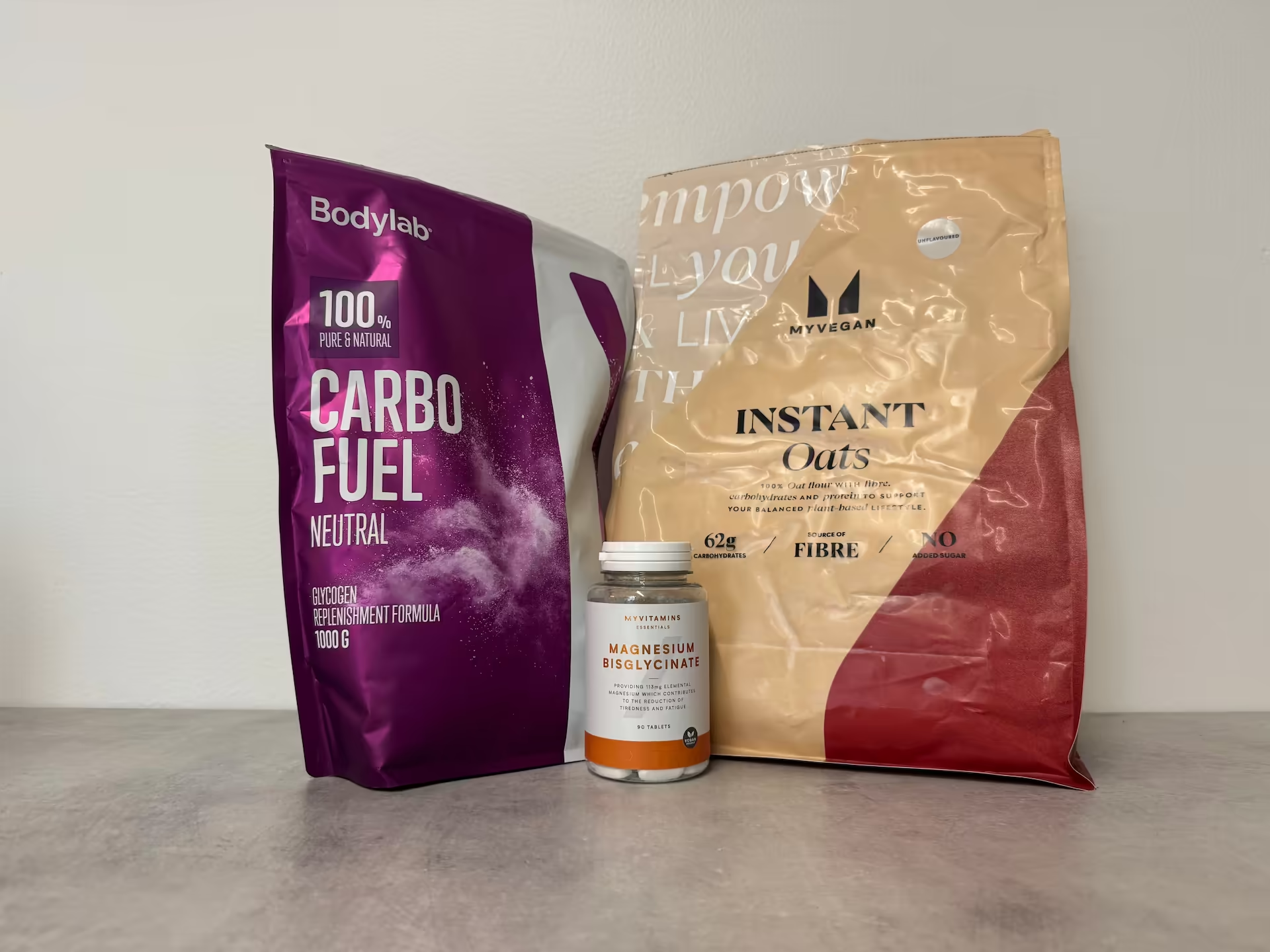
Bonus: Magnesium – can help with sleep and stress problems
When it makes sense
Magnesium can be relevant during intense training, high stress levels, sleep problems, or frequent muscle cramps.
Research shows that a slight deficiency in magnesium can negatively affect muscle recovery and sleep quality – but in people with normal diet, actual deficiency is rare.
Therefore, supplements primarily make sense if your diet is one-sided, or if you experience concrete symptoms.
Practical use
- 200–400 mg magnesium bisglycinate or magnesium malate 1–2 hours before bedtime.
- These forms are better absorbed and cause fewer stomach problems than magnesium oxide.
- Take it with a light meal if you're sensitive to supplements on an empty stomach.
Who should avoid it
If you get plenty of magnesium through vegetables, nuts, seeds, and whole grains, extra supplements are unnecessary.
People with kidney disease should only take magnesium supplements after agreement with doctor.
Price and brands we recommend
A monthly supplement typically costs 20–30 kr.
We recommend well-documented products with clear dosage indications:
- Pharmacy's own brand
- Matas' own brand
- Bodylab
- Bulk
- Myprotein
Bonus: Carbohydrates – for special training situations
Carbohydrates are the body's primary energy source for strength and cardio training.
Most people don't need extra supplements, but in special cases – e.g., training on an empty stomach, long sessions, or busy days with skipped meals – they can make a noticeable difference.
Fast carbohydrates (sugar)
When it makes sense
- During training on completely empty stomach
- During training sessions over 90 minutes
- When it's been more than 3 hours since last meal
In these situations, fast carbohydrates help stabilize blood sugar and ensure quick energy for training.
Practical solution
- 300-400 ml juice or 30–40 g dextrose or maltodextrin approximately 30 minutes before training.
- Can also be used during long training sessions to maintain intensity.
Price and brands we recommend
For a client who trains 2 times Full Body per week and uses 40 g dextrose per time, a monthly supplement costs approximately 30 kr. – depending on current offers. For most people, dextrose powder is an emergency solution, and a large glass of juice will be just as good.
- Bodylab
- Bulk
- Myprotein
Slow carbohydrates (complex carbohydrates)
When it makes sense
- When you lack time for a full meal before training
- As a practical "office backup" or supplement on busy days
Practical solution – Instant Oats Office Recipe
- 40–80 g instant oats
- 30–60 g protein powder
- 300 ml water or milk
Store the ingredients in a dry shaker at the office.
When you need a quick, balanced meal: add liquid, shake and drink – 400+ calories in 30 seconds.
Price and brands we recommend
For a client who trains 2× Full Body per week and uses 80 g instant oats per time, a monthly supplement costs approximately 60 kr. – depending on current offers.
We especially recommend:
- Myprotein Instant Oats – finely ground, mild taste, easy to mix in shake
Where to buy quality products?
The most important thing isn't where you buy your supplements — but that you choose transparent products from documented manufacturers. Cheap isn't necessarily bad, but quality and declaration must be in order.
Recommended retailers
- Pharmacy (physical store): Highest security, control, and possibility for advice.
- Matas.dk: Good balance between quality, price, and availability.
- Bodylab.dk: Danish producer with well-documented products and clear declaration.
- Myprotein.dk: Affordable choice with large assortment and ongoing discounts.
- Bulk.com/dk: European producer with high purity and simple formulations.
Quality markers to look for
- Third-party certification (especially important for Omega-3 and protein powder)
- Clear dosage information on the label
- Manufacturer information and contact address within EU
- Absence of excessive promises like "guaranteed results" or "rapid fat burning"
If you're in doubt, choose pharmacy or recognized Danish producers – you pay a little more but get documented quality and safety.
Monthly costs – Realistic budgeting
Even the best supplements should be adapted to your need and your activity level. Here's a realistic monthly estimate based on how much you train – from completely basic health to serious training.
Basic package (all living in Scandinavia)
The simple but effective solution for you who just want to cover the most important deficiencies in everyday life – especially in the winter half-year.
- D-vitamin: 20 kr
- Multivitamin: 60 kr
- Total: approximately 80 kr/month
Active package (regular training)
For you who train regularly and want to support recovery, energy, and muscle building with the most well-documented supplements.
- D-vitamin: 20 kr
- Multivitamin: 60 kr
- Omega-3: 60 kr
- Creatine: 25 kr
- Total: approximately 165 kr/month
Complete package (intensive training)
For you who train hard several times per week and want to optimize both performance, recovery, and muscle building.
- D-vitamin: 20 kr
- Multivitamin: 60 kr
- Omega-3: 60 kr
- Creatine: 25 kr
- Protein powder: 300 kr
- Total: approximately 465 kr/month
Complete package incl. bonus supplements (special situations)
For athletes, or in periods with extra high training volume, stress, or sleep deprivation – a couple of supplementary supplements can be relevant.
- Magnesium: 25 kr
- Carbohydrates (instant oats/dextrose): 60 kr
- Maximum total: approximately 550 kr/month
Your action plan – Start simple, build gradually
Step 1 – Everyone (start here): Buy vitamin D (25 micrograms). Take daily with dinner in the period October–March.
Step 2 – Most people: Add Omega-3 if you eat less than two fish meals per week.
Step 3 – Safety net: Add a multivitamin if you have irregular meals or a less varied diet.
Step 4 – Strength trainers: Add creatine if you strength train two or more times per week and want to optimize your results.
Step 5 – With protein deficiency: Add protein powder only if you don't reach 1.6–2.2 g protein per kg body weight through food.
Step 6 & 7 – Special needs: Magnesium for sleep or stress problems. Carbohydrates for special training situations.
The most important mistakes to avoid
Mistake #1: Starting with everything at once. Begin with vitamin D, evaluate after 4–6 weeks, and then add the next.
Mistake #2: Buying expensive "special formulas" or exotic blends. Basic versions work just as well at a fraction of the price.
Mistake #3: Believing that supplements can "fix" bad basic habits. No supplement can replace good food, regular training, and sufficient sleep.
Mistake #4: Falling for marketing promises. If it sounds too good to be true, it probably is.
Frequently asked questions about supplements
Are supplements necessary if you eat healthy?
No. If you eat varied, get enough sun, and sleep regularly, you rarely need many supplements. Most people living in Scandinavia still benefit from vitamin D and Omega-3, however, because it's difficult to get enough through sun and diet alone.
Is protein powder necessary?
No. If you get sufficient protein through food – e.g., meat, fish, eggs, and dairy products – you don't need protein powder. It's exclusively a practical supplement, not a requirement for getting results.
Can you take too many supplements?
Yes. Too high doses of especially fat-soluble vitamins (A, D, E, and K) can be harmful. Avoid combining several products with overlapping content, and stick to documented doses. More is not better.
What time of day should you take your supplements?
Most vitamins and minerals are best absorbed with food. Fat-soluble vitamins like vitamin D and Omega-3 should be taken with a meal that contains some fat. Creatine and protein can be taken anytime – the most important thing is that you take them consistently.
Conclusion: Less is often more
Supplements aren't about taking as much as possible – but about taking the right thing and using it consistently.
Start simple: Take vitamin D daily from October to March, supplement with Omega-3 if you rarely eat fish, and add creatine if you strength train regularly. That's all most people need.
Remember, supplements are exactly that – a supplement. They can never replace sleep, nutrition, strength training, and regularity, but they can support the foundation you build.
Want to understand why exactly these work and how you can optimize the rest of your lifestyle? Read our article What are supplements? – or book a free start-up conversation at Nordic Performance Training, and we'll help you create a realistic, evidence-based plan that fits your life.
References
Fødevarestyrelsen. (2024). Kosttilskud – Alt om kosttilskud. https://foedevarestyrelsen.dk/kost-og-foedevarer/alt-om-mad/kosttilskud
Sundhedsstyrelsen. (2024). D-vitamin og calcium – Anbefalinger til befolkningen. https://www.sst.dk/da/Borger/En-sund-hverdag/Kost/D-vitamin-og-calcium
Kreider, R.B. et al. (2023). International Society of Sports Nutrition position stand: safety and efficacy of creatine supplementation. Journal of the International Society of Sports Nutrition, 20(1), 2196367. https://doi.org/10.1080/15502783.2023.2196367
European Food Safety Authority (EFSA). (2023). Scientific Opinion on Dietary Reference Values for omega-3 fatty acids. EFSA Journal, 21(6), 8009. https://doi.org/10.2903/j.efsa.2023.8009
Ward, E. (2022). Multivitamin/multimineral supplements: Rationale and safety. Nutrition Reviews, 80(4), 679-691. https://doi.org/10.1093/nutrit/nuab059
Zhang, Y. et al. (2022). Effects of magnesium supplementation on blood pressure: a meta-analysis of randomized controlled trials. Hypertension, 79(10), 2205-2214. https://doi.org/10.1161/HYPERTENSIONAHA.122.19948
Calder, P.C. (2023). Omega-3 fatty acids and inflammatory processes. Nutrients, 15(6), 1331. https://doi.org/10.3390/nu15061331
Kerksick, C.M. et al. (2018). ISSN exercise & sports nutrition review update: research & recommendations. Journal of the International Society of Sports Nutrition, 15(1), 38. https://doi.org/10.1186/s12970-018-0242-y
Schoenfeld, B.J. & Aragon, A.A. (2018). How much protein can the body use in a single meal for muscle-building? Implications for daily protein distribution. Journal of the International Society of Sports Nutrition, 15(1), 10. https://doi.org/10.1186/s12970-018-0215-1
Forbrugerrådet Tænk. (2023). Test af kosttilskuds kvalitet og sikkerhed. https://taenk.dk/test-og-forbrugerliv/sundhed-og-motion/kosttilskud-test-finder-uoensket-kemi
Related Blog Posts
.svg)
.svg)

.svg.webp)

